|
|
|
Sort Order |
|
|
|
Items / Page
|
|
|
|
|
|
|
| Srl | Item |
| 1 |
ID:
130865
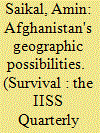

|
|
|
|
|
| Publication |
2014.
|
| Summary/Abstract |
Afghanistan's geostrategic potential is hampered by domestic weakness, regional tensions and major-power competition. Historically, Afghanistan's position at the junction between Asia and Europe has not only made it susceptible to outside invasions and influence, but also rendered it an important conduit for cross-continental interactions. The Greco-Bactrian (250-150 BCE), Kushan (30-375 AD) and Sassanid (224-651 AD) empires derived much of their wealth from the Silk Road, a series of interlinked trading networks criss-crossing the Eurasian land mass and centred around what is now known as Afghanistan. These routes served as the main arteries of east-west trade and transportation, until the disintegration of the Mongol Empire in 1368 AD effectively dismantled the network.
|
|
|
|
|
|
|
|
|
|
|
|
|
|
|
|
| 2 |
ID:
122011


|
|
|
|
|
| Publication |
2013.
|
| Summary/Abstract |
Africa is booming. Of that, there is little doubt. One feels it every time one lands in Lagos, Addis Ababa, Nairobi or Accra. Hotels are filled to the brim and business-class seats are sometimes hard to come by. Companies are struggling to fill executive positions because they are growing so rapidly. The energy on the streets is palpable, and the rest of the world is noticing. A recent issue of the Economist, for example, led with an article on 'Aspiring Africa' and included an advertisement for an Africa-focused conference in Dubai.1 This followed the first The Times CEO Summit Africa, held in Geneva earlier this year, and the first New York Forum Africa, which took place in Gabon in 2012 and brought over 500 global business leaders to the tiny West African nation. Events such as the IISS forum 'The Geo-economics of Resources and Conflict in Africa', held in Bahrain in April, also show that the world's perception of Africa is changing.
|
|
|
|
|
|
|
|
|
|
|
|
|
|
|
|
| 3 |
ID:
031188
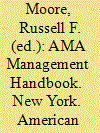

|
|
|
|
|
| Publication |
New York, American Management Association Inc., 1970.
|
| Description |
Hbk
|
| Standard Number |
0-8144-5212-4
|
|
|
|
|
|
|
|
|
|
|
|
Copies: C:1/I:0,R:0,Q:0
Circulation
| Accession# | Call# | Current Location | Status | Policy | Location |
| 007262 | 658/MOO 007262 | Main | On Shelf | General | |
|
|
|
|
| 4 |
ID:
130871
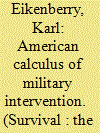

|
|
|
|
|
| Publication |
2014.
|
| Summary/Abstract |
The protracted campaigns in Afghanistan and Iraq have diminished America's appetite for waging wars to end tyranny or internal disorder in foreign lands. Military interventions have traditionally been a source of controversy in the United States. But America's appetite for the dispatch of armed forces has been diminished greatly by factors that have primarily emerged in the twenty-first century. These include, most painfully, the protracted campaigns in Afghanistan and Iraq that have made US political and military leaders more cautious about waging wars to end tyranny or internal disorder in foreign lands.
|
|
|
|
|
|
|
|
|
|
|
|
|
|
|
|
| 5 |
ID:
047627
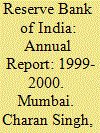

|
|
|
|
|
| Publication |
Mumbai, Charan Singh, 2000.
|
| Description |
xi, 242p.
|
|
|
|
|
|
|
|
|
|
|
|
Copies: C:1/I:0,R:0,Q:0
Circulation
| Accession# | Call# | Current Location | Status | Policy | Location |
| 043589 | 332.110954/RES 043589 | Main | On Shelf | General | |
|
|
|
|
| 6 |
ID:
124221
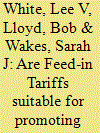

|
|
|
|
|
| Publication |
2013.
|
| Summary/Abstract |
Feed-in Tariffs (FITs) implemented by city councils in the USA have proven an effective means of stimulating installation of renewable-electricity generation capacity at a local level, and may also be effective for New Zealand cities. Though New Zealand has a high proportion of electricity generated renewably, this is mostly from centralized hydroelectricity plants. The suitability of city-level FITs for promoting solar photovoltaic panels in New Zealand is examined. Findings suggest that FITs, with rates obtained using the cost-of-generation method, could be implemented in New Zealand cities at rates comparable to those in successful FIT schemes internationally. The unique structure of New Zealand's liberalized electricity market, however, is likely to make financing FIT schemes at city-level more complex than the equivalent situation in the USA. Benefits of introducing such schemes will include the possibility for purchasers of solar PV systems to calculate returns on investment over the long term, and the streamlining of the grid connection process by reducing the number of authorities involved.
|
|
|
|
|
|
|
|
|
|
|
|
|
|
|
|
| 7 |
ID:
133563
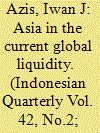

|
|
|
|
|
| Publication |
2014.
|
| Summary/Abstract |
In contrast with the pre~1997/98, today's emerging Asia registers excess savings. Since early 2000s, the liquidity was further boosted by in?ows of capital including those going through the banking sector. After a brief, yet sharp, interruption at the beginning of the global ?nancial crisis, in?ows resumed albeit of different form and inducted by different agents. Nonetheless, the global liquidity sphere has clearly changed. When the quantitative easing tantrum began in May last year, volatility returned. Largely due to a lack of innovative policy response, the episode of vacillating flows produced repercussions not different than in the past because the incentive system remains unchanged. Consequendy, vulnerability still rises with capital ?ows. The 'rational' response of agents is equally predictable, raising the risk of financial instability and exacerbating the already widening income disparity. Nothing is fundamentally new, everyone continues to "dance with the system."
|
|
|
|
|
|
|
|
|
|
|
|
|
|
|
|
| 8 |
ID:
130868
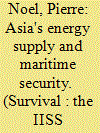

|
|
|
|
|
| Publication |
2014.
|
| Summary/Abstract |
Asia's reliance on international, seaborne energy trade is conducive to strategic cooperation. Whether this will outweigh strategic competition is far from certain. The Asia-Pacific accounts for a large and growing share of the world's energy-demand growth. With imports rising faster than consumption, the region is rapidly becoming the new centre of gravity for global energy markets. Such dynamics have made energy security a key policy concern for Asian states. The naval capacities of these countries are also growing swiftly, prompting some analysts to ask whether an arms race has begun. Although no one would suggest that this build-up of naval power is primarily driven by the need to secure energy supplies, the Chinese and Indian governments have identified energy and resource security as one rationale for developing naval power, particularly blue-water capabilities.
|
|
|
|
|
|
|
|
|
|
|
|
|
|
|
|
| 9 |
ID:
172453
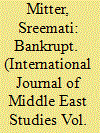

|
|
|
|
|
| Summary/Abstract |
In the late 1930s, the first independent Arab banks in Palestine, the Arab Bank and the Arab Agricultural Bank, sued customers who had defaulted on loans in an attempt to maintain solvency. Their indebted customers, unable to pay, fought back to prevent their lands from being foreclosed and sold to Zionist buyers. Each party claimed that its position was consistent with, indeed essential to, the anti-Zionist nationalist cause. The story of these pioneering Arab banks and their legal battles with their customers in the wake of the 1936-1939 revolt provides insight into Arab financial life in Mandate Palestine. It reveals the banks’ struggles to survive; complicates notions of Arab-Palestinian landlessness and indebtedness; and argues that political and economic exigencies, not reductive notions of collaboration or patriotism, produced the banks’ antagonistic relationship with their customers, whereby the survival of one came at the expense of the other.
|
|
|
|
|
|
|
|
|
|
|
|
|
|
|
|
| 10 |
ID:
105944
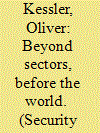

|
|
|
|
|
| Publication |
2011.
|
| Summary/Abstract |
While security and finance are certainly different social spheres, the fact that we can detect similar shifts in both points to the existence of something that precedes these 'realities'. If finance and security are said to be different, intertwined and related, the question then arises as to what it is that constitutes the differences and similarities between them. This article argues that further inquiry into the boundary between the two leads us to understand processes of securitization and financialization as constitutive processes by which actors, behaviours, practices or communications are considered to be economic or securitized. To capture processes of financialization, the article draws on systems theory in general and the concept of functional differentiation in particular.
|
|
|
|
|
|
|
|
|
|
|
|
|
|
|
|
| 11 |
ID:
138335


|
|
|
|
|
| Summary/Abstract |
This article considers the importance of Al-Qaeda and Pakistan in driving British Islamic extremist terrorism during the past decade. Between 2003 and 2013, almost 50 British-born Muslims engaged in multiple high-profile terrorism conspiracies. All were designed to kill or seriously injure British citizens. Drawing on recently obtained court transcripts which offer remarkable detail, these plots are analysed from the point of view of radicalization, finance, training and operational direction. The emergence of extremist terrorism in the UK has its genesis within the Islamic fundamentalist movement, a socio-political ideology that arrived in London in the early 1990s. Contrary to the prevailing discourse, members of the movement constitute a far from homogenous set of individuals. Based on age, overseas connections, experience of conflict and religiosity, they each fulfill diverse tasks that range from preaching and fundraising to facilitating combative jihad. A minority adopted an extremist position that led them to carry out acts of terrorism. Since 2006, the role of Al-Qaeda and Pakistan in relation to this process has steadily declined. For the past seven years British Islamic extremists have pursued terrorism in whatever way they can on their own, with little or any direct support or influence from overseas. The security agencies are now asking how far current events in Syria will overturn this state of affairs.
|
|
|
|
|
|
|
|
|
|
|
|
|
|
|
|
| 12 |
ID:
041491
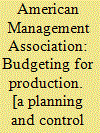

|
|
|
|
|
| Publication |
New York, American Management System, Inc., 1970.
|
| Description |
130p.Hbk
|
|
|
|
|
|
|
|
|
|
|
|
Copies: C:1/I:0,R:0,Q:0
Circulation
| Accession# | Call# | Current Location | Status | Policy | Location |
| 009724 | 658.5/AME 009724 | Main | On Shelf | General | |
|
|
|
|
| 13 |
ID:
181527
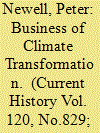

|
|
|
|
|
| Summary/Abstract |
Without deep transformations in the economy that go beyond incremental gains in decarbonization, we remain on course for catastrophic global heating. Some businesses have pledged to go carbon-neutral, carbon-trading schemes are expanding, and a growing divestment movement has pressured investment funds to shun fossil fuel producers. But financial forces are also part of the problem, still driving more production and consumption of fossil fuels. Achieving transformational shifts in finance, production, and governance calls for a more disruptive politics underpinned by shifts in power relations.
|
|
|
|
|
|
|
|
|
|
|
|
|
|
|
|
| 14 |
ID:
097827


|
|
|
| 15 |
ID:
126995
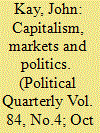

|
|
|
|
|
| Publication |
2013.
|
| Summary/Abstract |
The term 'capitalism' is no longer a relevant way in which to describe or to understand a modern economy. Ownership of capital is not the source of economic power that it once was. Business leaders of today do not own the factories and the machines, nor do they need to. Let us consider instead, markets. Not the markets for financial products that we see depicted on rows of flickering screens in Canary Wharf, but real markets. Market economies have proved to be chaotic, and imperfect and yet they are the most successful way we know to allocate goods and services. Through a process of experimentation, much failure and some success they evolve. Their development is necessarily uncertain, but that is also their greatest strength.
|
|
|
|
|
|
|
|
|
|
|
|
|
|
|
|
| 16 |
ID:
157724
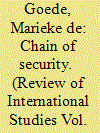

|
|
|
|
|
| Summary/Abstract |
Increasingly, private companies – including Twitter, airlines, and banks – find themselves in the frontline of fighting terrorism and other security threats, because they are obliged to mine and expel suspicious transactions. This analytical work of companies forms part of a chain, whereby transactions data are analysed, collected, reported, shared, and eventually deployed as a basis for intervention by police and prosecution. This article develops the notion of the Chain of Security in order to conceptualise the ways in which security judgements are made across public/private domains and on the basis of commercial transactions. Drawing on the work of Bruno Latour, this article understands the security chain as the set of practices whereby commercial transactions are collected, stored, transferred, and analysed, in order to arrive at security facts. Understanding the trajectory of the suspicious transaction as a series of translations across professional domains draws attention to the processes of sequencing, movement, and referral in the production of security judgements. The article uses the chain of financial suspicious transactions reporting as example to show how this research ‘thinking tool’ can work. In doing so, it aims to contribute to debates at the intersection between International Relations (IR) and Science-and-Technology Studies (STS).
|
|
|
|
|
|
|
|
|
|
|
|
|
|
|
|
| 17 |
ID:
087969
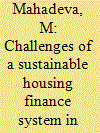

|
|
|
| 18 |
ID:
075041
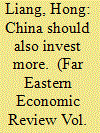

|
|
|
|
|
| Publication |
2006.
|
| Summary/Abstract |
Hong Liang, senior China economist at Goldman Sachs, finds a bone of contention with the IMF over investment in China.
|
|
|
|
|
|
|
|
|
|
|
|
|
|
|
|
| 19 |
ID:
120105
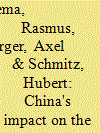

|
|
|
|
|
| Publication |
2013.
|
| Summary/Abstract |
China's economic rise has transformed the global economy in a number of manufacturing industries. This paper investigates whether China's transformative influence extends to the new green economy. Drawing on the debate about how China is driving major economic changes in the world - the "Asian drivers" debate - it identifies five corridors of influence and investigates their relevance for the wind energy industries. Starting with the demand side, it suggests that the size and rapid growth of the Chinese market have a major influence on competitive parameters in the global wind power industry. While Western firms have found ways of participating in the growth of the Chinese market, the government's procurement regimes benefit Chinese firms. The latter have invested heavily and learned fast, accumulating production capabilities that have led to changes in the global pecking order of lead firms. While the combined impact of Chinese market and production power is already visible, other influences are beginning to be felt - arising from China's coordination, innovation and financing power.
|
|
|
|
|
|
|
|
|
|
|
|
|
|
|
|
| 20 |
ID:
168176
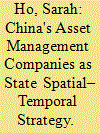

|
|
|
|
|
| Summary/Abstract |
Chinese authorities created four new asset management companies (AMCs) in 1999. These have since undergone profound transformations which have been influential in China's contemporary integration into the world market. Conventional interpretations see these powerful AMCs in largely technical and asocial terms. By contrast, we employ a critical geographical analytical framework to understand the transformation of these AMCs as an expression of the state's spatial–temporal strategy to create conditions of political economic stability now by displacing the conditions of financial instability and crisis into the future. This strategy does not come without unintended and destabilizing consequences, nor is it without class-based social and political implications.
|
|
|
|
|
|
|
|
|
|
|
|
|
|
|
|
|
|
|
|
|